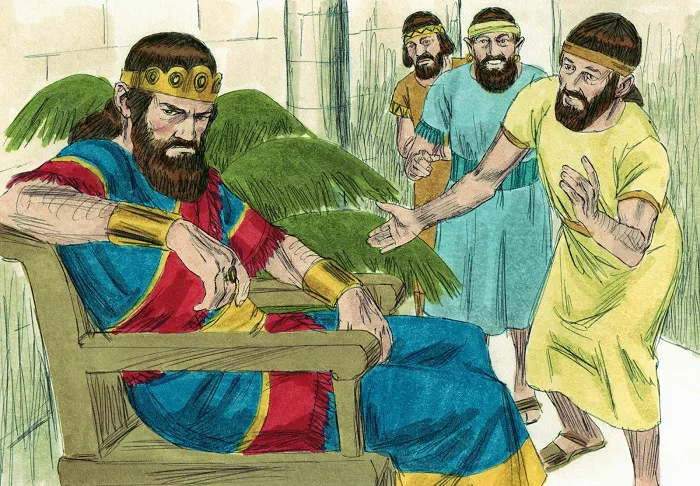Saul and David were the first two kings of Israel. Their reigns marked a significant period in the history of the nation. Each had unique achievements that shaped the course of Israel’s history.
The Achievements of Saul
Saul’s Early Life and Anointing
Saul was the son of Kish, a wealthy Benjamite. He was handsome and tall, standing a head above everyone else. Samuel, the prophet, anointed Saul as the first king of Israel. This was a significant event as it marked the transition from the period of judges to the era of kings.
Unification of the Tribes
One of Saul’s notable achievements was the unification of the tribes of Israel. Before Saul, Israel was a loose confederation of tribes. They often acted independently and were frequently in conflict with each other. Saul brought them together under a single monarchy. This unification provided a stronger front against their enemies.
Military Successes
Saul was a capable military leader. He led Israel to several victories against their enemies. Some of his notable military achievements include:
Victory over the Ammonites: Early in his reign, Saul rescued the city of Jabesh–gilead from the Ammonites. This victory solidified his position as king and earned him the support of the people.
Defeat of the Philistines: Saul’s most significant military achievements were against the Philistines. They were a constant threat to Israel. Saul led several successful campaigns against them, which helped secure Israel’s borders.
Battles against the Moabites, Edomites, and Amalekites: Saul also fought and defeated other neighboring enemies. These victories expanded Israel’s territory and secured its borders.
Establishment of a Standing Army
Saul established a standing army for Israel. Before his reign, Israel relied on volunteer militias. Saul’s army was a more organized and professional force. This development allowed Israel to respond more quickly and effectively to external threats.
Saul’s Religious Reforms
Saul made several attempts to strengthen Israel’s religious practices. He offered sacrifices and sought guidance from God through Samuel. However, his disobedience in certain matters, such as the incomplete destruction of the Amalekites, led to his rejection by God as king.
Saul’s Legacy
Saul’s reign laid the foundation for the future monarchy. His efforts in unifying the tribes and establishing a standing army were significant. However, his disobedience to God’s commands and his troubled relationship with David marred his legacy.
See Also: Who Is Saul in the New Testament?
The Achievements of David
David’s Early Life
David was the youngest son of Jesse, a shepherd from Bethlehem. He was anointed by Samuel to be the future king of Israel. David’s early life was marked by his courage and faith in God.
Victory Over Goliath
David’s first major achievement was his victory over Goliath, the Philistine giant. This event demonstrated David’s faith and bravery. It also marked the beginning of his rise to prominence in Israel.
David’s Leadership in Saul’s Army
David became a successful military leader under King Saul. He led many successful campaigns against the Philistines and other enemies. His success made him popular among the people and earned him the jealousy of Saul.
Unification of the Kingdom
After Saul’s death, David was anointed king of Judah. Later, he became king over all Israel. David’s reign marked the true unification of the tribes. He established Jerusalem as the capital city, which became the political and religious center of Israel.
Expansion of the Kingdom
David expanded Israel’s territory significantly. He conquered several neighboring nations, including the Philistines, Moabites, Edomites, and Ammonites. These conquests secured Israel’s borders and brought wealth and stability to the kingdom.
Establishment of Jerusalem as the Capital
David captured Jerusalem from the Jebusites and made it the capital of Israel. This was a strategic and symbolic move. Jerusalem became the political and religious heart of the nation. David brought the Ark of the Covenant to Jerusalem, further establishing its religious significance.
David’s Military Reforms
David reorganized the military. He established a professional army with a strong chain of command. This allowed Israel to maintain its security and expand its influence.
Religious Reforms and the Ark of the Covenant
David had a deep faith in God. He made several religious reforms to strengthen Israel’s worship practices. He brought the Ark of the Covenant to Jerusalem, which symbolized God’s presence among the people. David also planned for the construction of the Temple, though it was his son Solomon who built it.
David’s Psalms and Legacy
David is credited with writing many of the Psalms, which are poetic prayers and songs used in worship. These Psalms have had a lasting impact on Jewish and Christian worship. David’s reign is often seen as the golden age of Israel. His leadership, military successes, and religious devotion left a lasting legacy.
Comparison of Saul and David
Saul and David were both significant figures in Israel’s history. However, their achievements and leadership styles were different.
Unification of Tribes: Saul began the unification of the tribes, but David completed it. David’s establishment of Jerusalem as the capital was a key factor in this unification.
Military Successes: Both kings had military successes, but David’s conquests were more extensive. David’s victories expanded Israel’s territory and brought greater stability.
Religious Devotion: David’s deep faith and religious reforms had a lasting impact on Israel’s worship practices. Saul’s disobedience led to his rejection by God.
Legacy: David’s legacy is seen as more positive. His reign is often viewed as the golden age of Israel. Saul’s reign, though significant, was marred by his disobedience and troubled relationship with David.
Conclusion
Saul and David were instrumental in shaping the history of Israel. Saul’s achievements in unifying the tribes and establishing a standing army were significant. David’s military successes, unification of the kingdom, and religious reforms left a lasting legacy. Both kings had unique strengths and weaknesses, but their combined efforts laid the foundation for the future of Israel.


